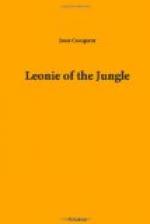“Usual large gentle eye, hawk nose, mobile mouth and small-boned oval face” would doubtlessly have been the flippant comment of any occidental passer-by; “meet ’em everywhere, gambling at the street corner, or squatting in the bazaar, or riding elephants.”
Yes! but—is not India’s future history writ large upon that small-boned oval face for those who, having the vision, read as they walk warily.
For those who run hastily past life’s signposts cannot and will not see that, like the fresh green grass which hides the dug pit, those gentle luminous eyes draw attention from the subtle cruelty of the mouth, through which gleam the pitiless perfect teeth.
Glorying in his bull-neck and massive chin, and blinded by his insular, inherited upbringing, the European will exclaim “Pah!” at sight of the thin cheek and delicate oval face, failing utterly to notice the set of the ears on the head; just as, muscle bound through worship at the shrine of Sport, he will mistake the eastern courtesy and poetry of movement for obsequiousness and humility, ignoring the terrible root from which these delicate flowers spring; the root of patience; with its tentacles ever twining and twisting through the eastern mind, causing the very old to die placidly with a smile on their shrivelled lips, and the young to envisage plague, pestilence, and famine with a mere lifting of the shoulder. Patience! the card which India does not hold up her sleeve in the game of life she is playing; the dull-coloured drab little bit of cardboard which she throws on the table openly, but which we ignore amongst the highly coloured, bejewelled pictures she places before us, smiling with the tender luminous eyes so that we shall forget the subtle cruelty of the mouth.
Placing his offerings at the holy man’s feet, and laying the garlands gently about the bowed shoulders, Madhu Krishnaghar, the son of princes, stooped and lifting the hem of the dust-covered garment, laid it against his forehead, then quietly sat down a pace removed from the ancient who took no notice whatever of his proceedings.
And time passed, linking one hour of noon to its neighbour and the next, until the hags, matrons, maidens, and little maids awoke to the freshness of the evening and the monotony of its tasks.
Kites called, crows screamed, men gambled in the shadows of the evening and the upstanding, distorted, disgusting water buffalo; while the two men, master and pupil in the religion of death, sat hour after hour without movement, staring at the mountains, the dwelling-place of Siva the terrible, and the birthplace of Kali his bride.
Far into the night they sat, until the last quarter of the moon had sunk to rest, when, with one single movement, the old man sprang to his feet, flung out his arms, and bent in utter humility and cast dust upon his once white turban.
His voice was but a shrill cracked whisper when he called upon his god from the crumbling top of the sunbaked, moon-drenched wall, and turning, lifted his travel-stained mantle and laid it on the young shoulders beside him.




